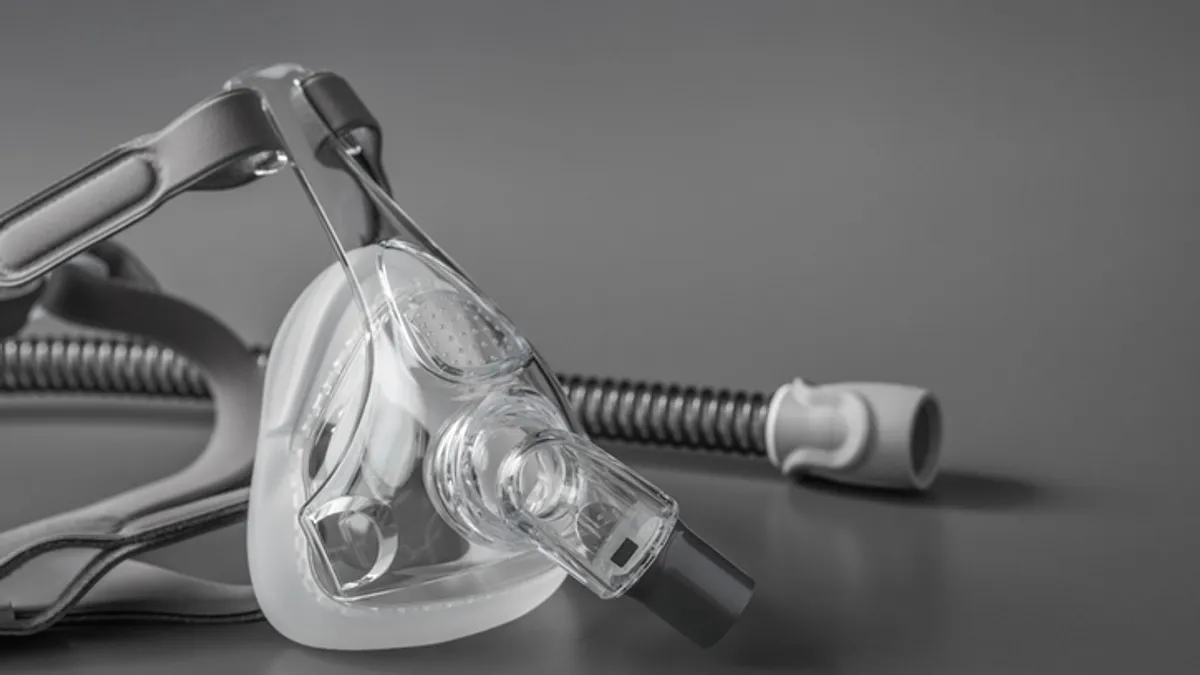Dive Brief:
- ResMed is seeing increased demand for its respiratory care products thanks to a recall by competitor Philips of its sleep apnea and ventilator machines. Earlier this year, Philips increased the recall to 5.2 million devices because of the foam used to dampen the sound from the machines, potentially exposing users to toxic chemicals.
- While ResMed still expects to see a $300 million to $350 million revenue boost for its 2022 fiscal year, the company is struggling to meet the demand as supply chain problems persist. "We have to be the No. 1 player and the No. 2 player by market share to cover the needs and we just simply, with supply chain shortages — particularly around electronic components and semiconductors — can't keep up with all the demand," CEO Mick Farrell told the virtual Citi Healthcare Conference on Wednesday.
- Farrell expects the situation to improve later this summer, in part because of some supply chain changes the company has made. Still, when Philips will return to the market is less certain. The Dutch conglomerate plans to finish its program to repair and replace the affected devices by the end of 2022, even though that may get pushed out into 2023.
Dive Insight:
ResMed posted a 12% revenue increase in its latest quarter, driven in part by the ongoing recall of Philips' CPAP and BiPAP machines. However, the amount of market share that ResMed can capture is limited by supply chain constraints. ResMed is expected to capture about 10% of market share from Philips as a result of the recall, according to a Feb. 14 note by Needham & Company analysts.
Philips announced the recall last June, which has since been expanded to more than 5 million devices. In its most recent earnings call, the company said it expects to take until December 2022 to finish repairing or replacing the affected devices. However, Needham analysts noted it could take until 2023 for Philips to re-enter the market.
"It’s a big impact on the doctors, the providers, the whole ecosystem," ResMed's Farrell said at the conference. "It's been really tough. I think the hardest hit in an event like this with five-plus million devices affected are the patients."
Needham analysts expect ResMed to capture as much market share as it can this year with its revenue growth slowing in 2023 as Philips re-emerges as a competitor in the space.
ResMed still is sticking to its forecast of bringing in an additional $300 million to $350 million in revenue as a result in its fiscal 2022 year, which ends in June. In the company’s fiscal first quarter, sleep and respiratory care revenue increased by $88 million, while it climbed by $60 million in the quarter ended in December.
The rest of that increase is expected to take place later this year as ResMed expects more components to free up in the second half of 2022. That’s because the company re-engineered its supply chains and its Airsense 10 devices and also has been "begging and pleading" its current suppliers for needed components. In 2021, the company also launched its Airsense 11 CPAP machine, which is expected to ramp up in the U.S.
"So all four of those [developments] give us confidence… that we can free up supply for June, September and December," Farrell said.
The CEO added that ResMed had walked through a number of scenarios where Philips makes a comeback as early as this fall or as late as March of 2023. However, Farrell didn't appear concerned about the prospect of a competitor returning, noting that ResMed has a 60% mask attach rate to Philips' devices, and that it would simply be better for patients.











